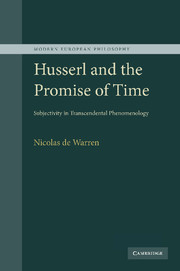Book contents
- Frontmatter
- Contents
- Acknowledgments
- List of abbreviations
- Introduction: the promise of time: subjectivity in Husserl's transcendental phenomenology
- 1 The ritual of clarification
- 2 A rehearsal of difficulties
- 3 The ghosts of Brentano
- 4 The retention of time past
- 5 The impossible puzzle
- 6 The lives of Others
- 7 The life of consciousness
- Appendix: note on textual sources
- Bibliography
- Index
5 - The impossible puzzle
Published online by Cambridge University Press: 20 January 2010
- Frontmatter
- Contents
- Acknowledgments
- List of abbreviations
- Introduction: the promise of time: subjectivity in Husserl's transcendental phenomenology
- 1 The ritual of clarification
- 2 A rehearsal of difficulties
- 3 The ghosts of Brentano
- 4 The retention of time past
- 5 The impossible puzzle
- 6 The lives of Others
- 7 The life of consciousness
- Appendix: note on textual sources
- Bibliography
- Index
Summary
Wir bohren und sprengen, wie in diesen Abhandlung überhaupt, allseitig Minengänge nach all möglichen Seiten.
— HusserlThe Bernau Manuscripts
Husserl's penchant for self-critique is nowhere more exemplified than in research manuscripts dedicated to the analysis of time-consciousness written during two vacations in the Black Forest town of Bernau in the fall of 1917 and spring of 1918. In the summer of 1917, Edith Stein began preparing the ITC lectures for publication, and eventually joined Husserl in Bernau to inform him of her progress and continue her work in consultation with the “master.” Stein's visit provided a catalyst for Husserl to return to his investigations of time-consciousness, suspended since 1911, in light of the transcendental expansion of phenomenology since the Ideen. In reading these manuscripts, perhaps the most obstinate of Husserl's corpus, one cannot help but think of the circumstances in which they were written, in the catastrophic twilight of a war to which Husserl had personally sacrificed, but which he also, as with other German philosophers, patriotically supported. One is also reminded of the reflections on time and narration, within a sweeping examination of European culture and the sources of its undoing, in the reclusive setting of a Swiss sanatorium in Thomas Mann's Magic Mountain. In his retreat in the Black Forest, Husserl returns to the theme of time-consciousness just as the wider promise of transcendental phenomenology for the crisis of European rationality began to take shape in his mind, and which would mature into the unfinished Crisis of the European Sciences, published in piecemeal at the dawn of the next world war.
- Type
- Chapter
- Information
- Husserl and the Promise of TimeSubjectivity in Transcendental Phenomenology, pp. 177 - 208Publisher: Cambridge University PressPrint publication year: 2009

